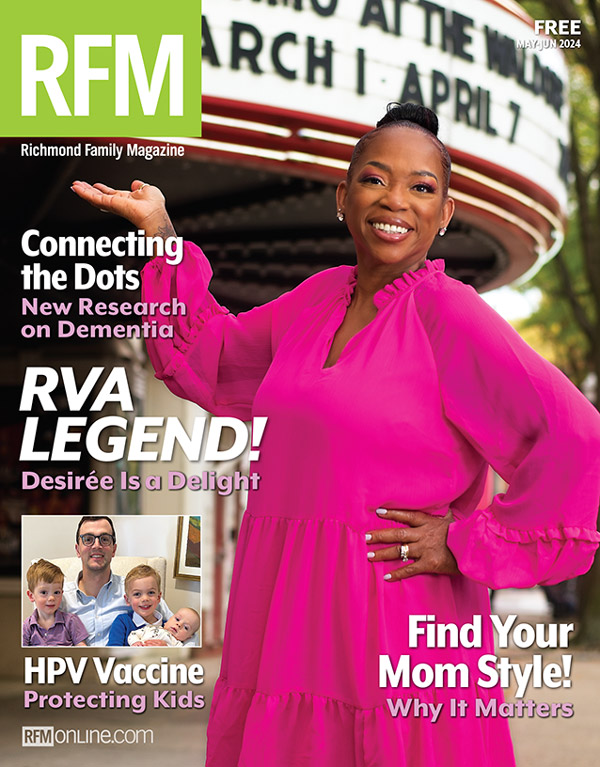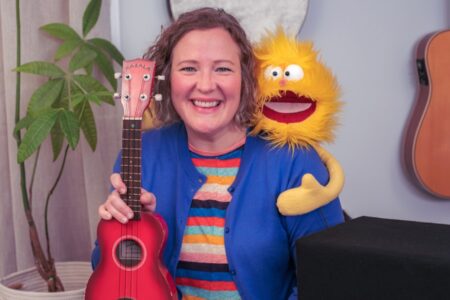Starting and sustaining a business can be challenging for anyone, but what does that look like when its owners are a couple? According to a survey of business owners by the U.S. Census Bureau, more than a quarter (28.2 percent) of business owners who responded said their outfits were family-owned. And while the agency doesn’t provide any clear-cut data on mom-and-pop businesses, it does show that in 2002, there were more than 2.5 million businesses equally owned by women and men.
Many people say parenting is the most challenging and rewarding job there is, but when you factor in work-related issues of running a company, the level of stress heightens. Combining a business with a marriage and family takes effort from both spouses. We’ve talked to four local couples who have made their partnerships a success and asked them to share their stories.
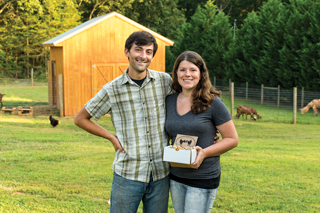 Green Acres – Goochland Style
Green Acres – Goochland Style
Togetherness is a way of life for Crystal and Kevin Neilson-Hall, who own The Freckled Farm Soap Company in western Goochland and also work together in Crystal’s enterprise, Neilson-Hall Photography.
The couple met as students at VCU School of the Arts and married in 2007. They started The Freckled Farm Soap Company in September 2013, two years after Neilson-Hall Photography was launched.
Kevin serves as Crystal’s second photographer for weddings on the photography side of things. “He understands for the most part that I am the creative person,” she says. “That is more my deal and he doesn’t have a problem. He jokes that he is along for the ride.”
The soap business gives the couple the opportunity to “express ourselves through soap,” Crystal says, who explains they raise Nubian goats on their farm. Their goat milk is extra moisturizing.
Before quitting his full-time job in home system automation, Kevin used his vacation weeks as trial runs for the couple’s business. “That helped us set up our roles and how they needed to be done,” Crystal says. “It gave us a taste of what it would be like.”
Their duties are evenly divided at the farm. Each spouse has a defined role in the business. “It keeps it more of a partnership,” Crystal says, noting that she and Kevin are best friends and that type of relationship is important. “Kevin is very laid back. I am more the face of the media and he prefers that. It allows him to be in the soap room making the soap.”
Because each of the businesses requires client interaction, both Crystal and Kevin interface with customers. “We are rarely together when it comes to selling soap,” Crystal says. “We are in two different locations on Saturdays. I am at South of the James and he’s at West End Market in Henrico. We have our own regular customers.”
The two make sure they schedule a meeting once a week to talk about the week ahead. “We decide what shows and markets to do,” Crystal says, adding that she handles all of the accounting for the businesses. “He trusts that I can make those big decisions. There is nothing we have been at odds with yet. When he has to make a change to the soap recipes, I trust him. We have very similar personalities and goals, which makes it easier to make decisions.”
The couple’s two children – their 5-year-old son Breckin and 3-year-old daughter Bryce – love to help out with the farm. “Our son is an entrepreneur. He likes to sell soap. He will talk to the customers about the soap and how the soap is made,” Crystal says, adding that he also collects eggs. “Our daughter fills the water buckets, and they both put the chickens away at night.”
Because they are a family business, the couple has added flexibility when it comes to family time. “We make our own schedule,” Crystal says. “We eat dinner at one in the afternoon and then do farm chores. Monday and Tuesday are our weekends. Our son is homeschooled so we are only dealing with our schedules. I feel like we are a team.”
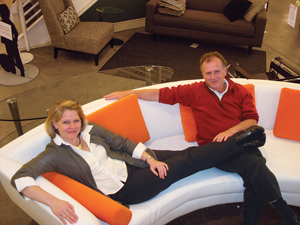 Respect and Retail in Richmond
Respect and Retail in Richmond
LaDiff owners Sarah Paxton and Andy Thornton make a good team at home and at work because of their personalities. “I am a drill-down-to-the-details person and Andy is at the 30,000-feet level,” says Sarah. “I have to swoop in and figure out how it works.”
The couple has been working together since 1991 when Sarah joined the business that Andy founded in 1980. “Work came before the relationship,” she says. “We were spending seventeen hours a day together with the business.”
Andy laughs when he tells the story of his introduction to Sarah and how he commented to one of his peers that Sarah “was amazingly smart and the best part is that I am not attracted to her in the slightest.” Four-and-a-half years later, he proposed on a business trip to Copenhagen, Denmark.
“We had a mutual respect for each other’s work ethic and intelligence,” Andy says, noting the couple will celebrate their twentieth anniversary in December.
One of the most difficult aspects of working together, they agree, is knowing when to respectfully turn off the business chatter, especially if one partner had a good day and the other had problems and wants to talk about them. “You also have to have respect for each other while you’re on the job,” Andy says. “As you get older, you know where your breaking point is. You have to keep the personal stuff at home. We are not perfect at that, but we have gotten better than we used to be. It’s all about respect. I keep coming back to that.”
They stress the importance of determining who is in charge of the different aspects of the business and keeping that in mind if there are issues. “You might still want to consult each other,” Sarah says. “We take the time to make an appointment with each other whenever it is needed.”
The couple also works with a business consultant who helps structure the company’s organizational chart. They found that employees would often come to one of them about a problem and if they didn’t like the answer they received, they would go to the other spouse. “That led
to some friction,” Andy says. “We would say ‘that is not my bailiwick – go to the other person.’”
They value family time with their 14-year-old daughter, Lucy, even though their schedules are tight. “Lucy has been part of figuring out how to have a family and a business,” Sarah says. “I came back to work in three weeks with a Pack ’n Play in my office. Lucy has been a part of this since day one, but has no interest in working here when she is older.”
Many of the family’s vacations are wrapped around a business trip. “Sometimes we will go early,” Sarah says. “We try to carve out times when the store is less busy and take some time.”
The family takes a big vacation at least once a year. They also make sure they attend all of Lucy’s activities, from volleyball to singing. “Truthfully, having a daughter we adore is a glue,” says Andy. “Having a family unit holds us together and brings back the sanity.”
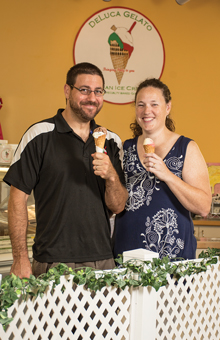 Sweet Shop in the West End
Sweet Shop in the West End
Nick and Terrie DeLuca of DeLuca Gelato started their business after Nick came home from his job teaching at a high school one evening and announced that he wanted to open a gelato shop. “I used to travel to Italy with my students and gelato is something I liked,” he says. “In Italy, you go out every day and get a gelato.”
The couple’s shop offers up to fifty flavors of gelato and sorbetto at one time. “Our flavors change,” Nick says. “We are completely our own production facility now. We make our own mix from scratch and we pasteurize.”
Married in 1998, the couple has two sons, 13-year-old Gio and 11-year-old Matt. Before opening the shop, Terrie, who had worked as a manager at Red Lobster previously, was a stay-at-home mom. Now she and Nick schedule their work hours so one of them can be home with the boys.
In the early days of the business when they both had to be at the shop, they brought the boys with them. “People would see the kids here while we were working,” Terrie says.
The couple had to make adjustments when they first started the business. Terrie went back to work at Red Lobster to help with finances for a few months. Opening and owning a business was “terribly scary,” she says. “It still is. We depend on people enjoying our products and coming back. Our security is based on people’s opinions. It’s important to us that we put out a quality product that is good for people and that tastes great.”
Terrie handles most of the bookwork for the business. Figuring out the process was “difficult at times and time consuming,”
she says. “It was a big learning curve.”
The couple often has common experiences at work. “She will have a rough day and there are times I am not in the mood to hear it because the same thing happened to me yesterday,” Nick says. “I just nod. There is a fine line between our business and our marriage.”
They have been able to sort through any issues they have. “We both have a certain way of doing things and you get used to your own way,” Nick says. “If something is done differently, there are times when you have to decide when to say something and when to let it go. The advantage of working with a spouse is that he or she is much more understanding.”
Taking time off from the job takes planning, especially since they don’t like to be off at the same time. When the boys had a baseball tournament this summer, for example, the couple talked about who would go with them. “I was off for four days with the boys,” Nick says. “Some of the days Terrie drove down. If we go to another tournament, we flip and she goes. We will take vacation around Christmas and early January and shut down for a week or two.”
The couple realizes their schedule would be more flexible if they hadn’t decided to open a production-driven business. “It would be easier,” Nick says. “This is not a nine-to-five job. It’s twelve hours a day.”
Their advice for other couples starting their businesses comes from personal experience. “You have to be very secure that this is somebody you are going through every up and down with,” Terrie says, adding that you need to be able to talk things out even if that is difficult. “You have to be able to listen. Take a step back and look at it from his perspective. You have to be able to laugh at yourself and recognize you are not perfect.”
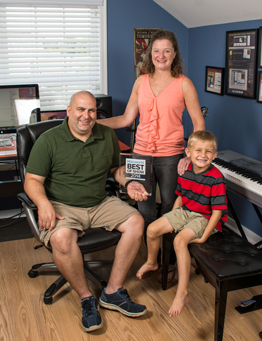 Work-at-Home Tech Team in Mechanicsville
Work-at-Home Tech Team in Mechanicsville
Diane and Kevin Hamilton, owners of Binary Formations, also met at work when they were both employed at a software company in Atlanta. Kevin started Binary part-time as a hobby shortly after they began dating in 2005. They married the following year and moved to Richmond in 2007. “It was a part-time hobby for five years,” Kevin says of Binary. “We took it to a full-time business in 2010.”
The idea of having a family enterprise didn’t scare them. They worked well together and were both risk takers when it came to business. “We knew we had that part down,” Diane says. “We were tired of working for someone else. A lot of people are afraid of leaving a job. For us, it was the opposite. We were afraid not to do it.”
They decided that Kevin would leave his full-time position first. Diane remained part-time for a year to see what type of revenue their company could pull in. “It helped us as a couple get our feet wet a little bit,” Diane says. “After the first month I went full-time with the company, I was ecstatic. I was so excited about it. Then I got nervous, but that didn’t last long.”
She worried about the peaks and valleys so common in the software industry. “It’s hard to get used to it,” Kevin says. “When you are in peak you can’t spend all your money because the valley is coming.”
Their company’s main product is Home Inventory, an app that stores information about the items in your home. The couple recently finished the latest version of the software for the Apple Mac, which includes mobile helper apps. Home Inventory is an Apple Mac App Store Editors’ Choice and Mac App Store’s Best of 2013.
Their other apps include My Reasons, which reminds you visually of why you want to stop a bad habit or start a new discipline (recently released for the Apple watch), and Chore-inator, a mobile app that won best in show at MacWorld. That one was created to help their 7-year-old son, Adam, focus on chores and “help us focus on managing the household,” Diane says. “We didn’t release it until we knew it was making a difference.” The couple also created Adam Learns Shapes and Colors. “We try to make it a family affair,” Diane says of their apps. “We are doing this to help solve problems in our own lives.”
The couple has separate offices in their Mechanicsville home and “we have doors,” Diane says, laughing. “What we do requires large amounts of time and focus.”
She admits it took some time to recognize each other’s boundaries and learn not to interrupt each other during busy times. “It took us a while to find out when those times were occurring,” Diane says. “We have learned to communicate and set boundaries.”
Their hours at the business vary. Diane sets regular hours, but that’s not as easy for Kevin who develops the software. “He will work until the wee hours of the morning,” Diane says. “We do try to keep it as normal as possible.”
One of the couple’s biggest motivating factors is Adam. When his bus arrives from school, Diane starts her “mom role,” she says. “If there is something pressing, I might sneak in a little work.”
The couple enjoys the flexibility that comes with owning your own business. “We can stay on vacation an extra day or if somebody in the family is ill, we can go there and bring our work with us,” Kevin says. “We can choose what we do. We make plenty of mistakes, but they are our mistakes. I actually love that.”
They never lose sight of the fact that they are a couple “first and always,” Kevin says. “This is not just a coworker. This is someone you love and have built a family with. It’s more important that the relationship survives. If this gets too tough, we will let go of the business.”
Their business is an equal partnership “with no tiebreaker,” he adds. “Either one person has to convince the other or give in. If you catch yourself, apologize. I highly recommend flowers.” And here’s another solid tip from Kevin: “If you do something wrong, say ‘I am sorry I was a jerk.’”
Tips and Suggestions from the App Developers
The Hamiltons, whose work-life mission it is to help families live in a more organized, less stressful fashion offer these strategies to help mitigate financial risk when starting a business with your spouse:
• Start as a side business to test the waters. Is there a market for this? Will it generate revenue?
• As things progress, work with your current employers to see if they will consider letting you work part-time. They might surprise you.
• In the beginning, have one spouse continue to work to bring in income while the other one works the business full-time.
• Know that you will never eliminate all risk.
• Cut out unnecessary spending ahead of time to find the minimum amount of income you must generate to support your family, and make sure you are confident the business has potential.
• Create a financial cushion by having some savings set aside before you leave your current employment. Things will come up and you don’t want the extra stress.
And when it comes to working together at home…
• Each spouse needs an office space with a door.
• If the door is shut, think twice before interrupting. If the door is open, come right in.
• Set boundaries for when business talk outside of a normal business day is okay or not okay and stick to them.
• Your spouse is your spouse first, not another employee. Treat him as such.
• Deal with disagreements immediately and with mutual respect. Have a regularly scheduled meeting to discuss open issues and financials, preferably off-site.

